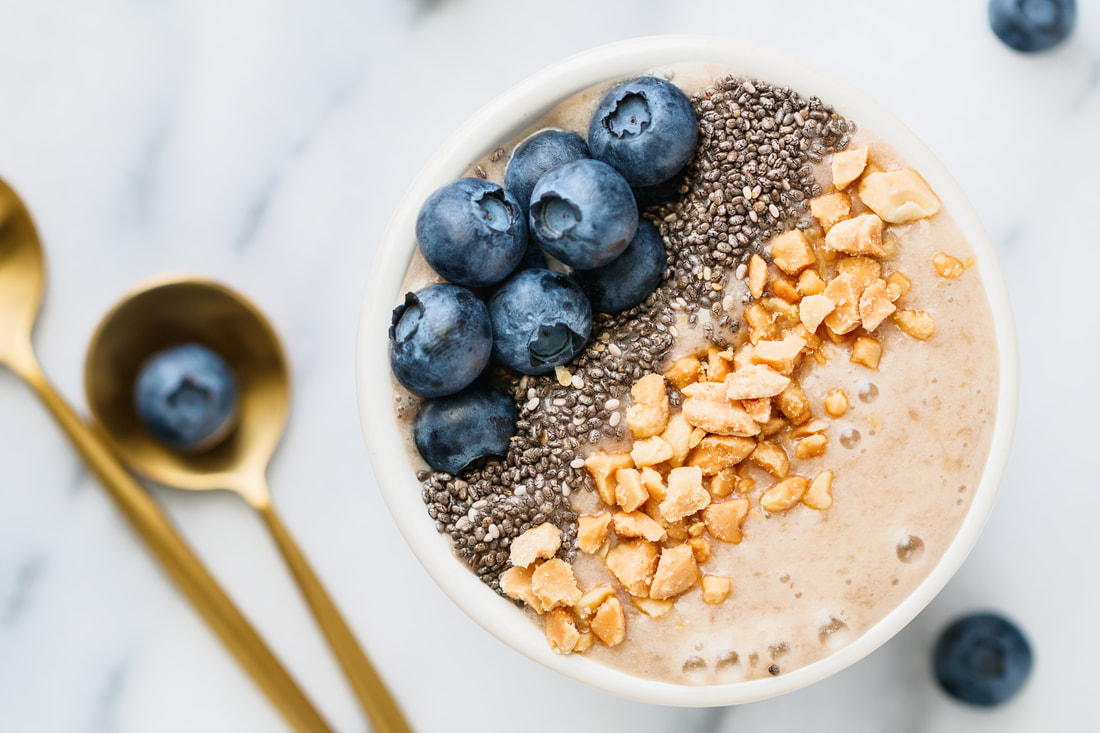|
Original blog written by Andrea Yu, Lumino Health Practicing self-care is a great way to manage stress. But it isn’t just about working out or meditating. What you eat — and how you eat — can also be a part of your self-care routine. Yoga Mamas registered dietitian, Iman Algheriany explains how implementing the benefits of good nutrition is one of many ways to take care of yourself. Why should nutrition be part of your self-care routine? Algheriany says that there is a close connection between self-care and nutrition. In times of stress, when we aren’t practicing self-care, our appetite, hydration and gastrointestinal health are affected. “Stress can cause malnutrition and even constipation,” Algheriany explains. “It affects how our body digests, absorbs and even eliminates waste.” But in times of stress, Algheriany says that good nutrition habits tend to be the first thing to go. “We turn to comfort eating when we’re stressed,” she says. That leaves us feeling sluggish and emotionally fatigued. How do you take care of yourself and practice self-care when it comes to diet? There are many ways to take care of yourself through nutrition. Here are 6 key nutritional practices from dietitian Iman Algheriany to add to your self-care checklist. 1. Have a good relationship with food “Nutrition is not black and white,” Algheriany explains. Labelling certain food items as ‘good’ or ‘bad’ is counterproductive for self-nutrition. And so are diets. “You’re always thinking ‘I have to give something up’ when you’re on a diet,” she says. “Or you think ‘I can’t have fun anymore’. That’s the exact opposite of self-care. I never think about restricting or limiting.” Instead Algheriany’s approach is to think about how we can feel good and energized through the way we eat. “We need to have a balance between pleasure and health in a mindful way,” she says. 2. Listen to your body “By following a regular eating pattern, your body gives you the right cues for hunger and satiety,” Algheriany says. “You’ll get a little hungry prior to lunch. That’s an indication that your body knows it’s time for a meal.” Algheriany says that we shouldn’t wait until we’re extremely hungry to eat. “That’s when we’re going to eat everything in sight,” she explains. At the other end of the scale, we can also pay attention to our satiety, or feelings of fullness. “We shouldn't leave a meal feeling full or stuffed,” Algheriany says. Instead, we should stop eating when we feel satisfied. Alternatively, we shouldn’t stop eating if we still feel hungry. To help our body establish good hunger and satiety cues, she recommends having three meals a day. “Lunch is probably the one meal that’s most often skipped,” she says. “It’s unfortunate because that’s when your body needs the most fuel. It’s the peak of the day.” 3. Practice the 80/20 rule every day What makes diets stressful is the all-or-nothing approach. Portions are limited or certain foods are forbidden, even if our body craves them. “It's important to have a balance between eating ‘good’ and enjoying life to sustain good habits,” says Algheriany. “That balance is key. Be 80% on your A-game and 20% human.” She discourages the concept of a ‘cheat day’. “If we do it for a whole day, we are going to throw our nutritional status off,” she says. Instead, we should adopt the 80/20 rule into our self-nutrition every day of the week. 4. Eat mindfully Eating mindfully allows us to better listen to our hunger and satiety cues. It also encourages us to chew more thoroughly and eat at a slower pace. “It’s as simple as turning off all electronics,” says Algheriany. This removes distractions so that we can focus on what we’re eating. “I find that if we’re mindful during a meal, we only eat the right portions,” says Algheriany. “We really do listen to our bodies.” Another way to eat mindfully is to use all our senses when we eat. Focus on the visual appearance of the meal and the different colours incorporated within it. Think about the texture of the food as you chew and how it smells. If you’re dining with someone else, listen to what they’re saying. Or pay attention to the sounds around you while you're eating. 5. Be kind to yourself “Don’t beat yourself up if you have an off-day,” says Algheriany. She says it’s common for people to compensate for a ‘bad’ day by restricting themselves the day after. That can cause more stress, during which a hormone called cortisol is released. “Cortisol can actually cause further weight gain,” Algheriany explains. “We really have to be nicer to ourselves.” 6. Use meal prep as a form of stress management Algheriany suggests making food at home more often than we eat out. There is the benefit of being able to control added sodium and fats. But cooking can also be a relaxing activity. “It’s a form of stress management without us even recognizing it,” Algheriany says. “I’m finding a lot of clients, especially with the pandemic, they’re trying new recipes and different cuisines.” Cooking with a spouse, friends or family is also a great way to spend time with loved ones. Socializing is an important part of the self-care checklist for many of us. “We’re able to connect a lot when it comes to cooking together or prepping together,” explains Algheriany. For people with busy schedules, she recommends doing meal planning and prepping once a week. “We’re making it easier for ourselves to prioritize our nutrition when we’re busy,” she says.
Comments are closed.
|
Categories
All
Archives
July 2024
|
-
Wellness Services
- Wellness Concierge
- Abdominal Massage
- Acupuncture
- Cosmetic Acupuncture
- Cesarean Scar Release Therapy
- Chinese Herbal Medicine
- Chiropractic Care
- Counselling >
- Craniosacral Therapy
- Online EFT Tapping
- Fascial Stretch Therapy
- Home Visits
- Online Holistic Nutrition
- Gua Sha Glow Facial
- Introduction to Solids
- Infant & Kids Massage
- Infant Sleep Consulting
- Kinesiology
- Kinesio Taping
- Lactation Consulting
- Light Therapy >
- Lymphatic Drainage Massage
- Massage Therapy
- Naturopathic Medicine
- Osteopathy
- Pelvic Floor Physiotherapy
- Physiotherapy
- Pediatric Physiotherapy
- Online Speech Language Therapy
- Ultrasound For Blocked Ducts
- Vitamin Injections
- FITNESS
- Doula Care
- WORKSHOPS & EVENTS
- Free Events
- Professional Trainings
- Blog
- SHOP ONLINE
Services |
ABOUT US |
|
A Note About yoga Mamas' Cancellation Policies
Please note that we do not offer refunds. Each event/course/training/wellness appt has it's own specific cancellation policy which is listed on each registration page. Please take the time to read these in full prior to registering. Each event/appointment that we run is in partnership with a practitioner who is focusing their independent career in prenatal and postpartum health. This is their beautiful livelihood. This is why we have these policies in place. Thank you very much for your understanding. Jamie Kalynuik, Founder of Yoga Mamas
[email protected] | 416-406-0116 | 1402 Queen St E Suite D. Toronto M4L 1C9
-
Wellness Services
- Wellness Concierge
- Abdominal Massage
- Acupuncture
- Cosmetic Acupuncture
- Cesarean Scar Release Therapy
- Chinese Herbal Medicine
- Chiropractic Care
- Counselling >
- Craniosacral Therapy
- Online EFT Tapping
- Fascial Stretch Therapy
- Home Visits
- Online Holistic Nutrition
- Gua Sha Glow Facial
- Introduction to Solids
- Infant & Kids Massage
- Infant Sleep Consulting
- Kinesiology
- Kinesio Taping
- Lactation Consulting
- Light Therapy >
- Lymphatic Drainage Massage
- Massage Therapy
- Naturopathic Medicine
- Osteopathy
- Pelvic Floor Physiotherapy
- Physiotherapy
- Pediatric Physiotherapy
- Online Speech Language Therapy
- Ultrasound For Blocked Ducts
- Vitamin Injections
- FITNESS
- Doula Care
- WORKSHOPS & EVENTS
- Free Events
- Professional Trainings
- Blog
- SHOP ONLINE




